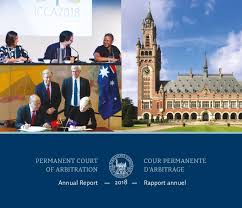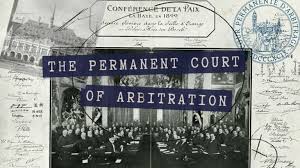


Indian Justice System | July 15, 2025
Role of the Permanent Court of Arbitration in India Related Disputes
This Article is Written by Aman Puri B.A.LLB 5th Year Student Of Bharati Vidyapeeth's New Law College, Pune.
Introduction
The permanent Court of arbitration raises vital role in resolving International disputes where International organisations private entities States all are involved. All the it doesn't work as a traditional court system. Still the significance in global arbitration is undeniable.
As we know India is a rapidly developing Nation and the major player in global economics also geopolitics. It has been part of several International disputes that found resolution through the PCA. Therefore, the objective of this research paper is to investigate the PCA's role in disputes involving India, focusing on landmark cases, India's legal framework for arbitration and the overall implications on domestic and international jurisprudence.
In this Research Paper, I have tried to elaborate on the relevance of PCA in the Indian context by analyzing how it has shaped International dispute resolution and affected India's legal stance globally.
Legal Framework
The Hague convention established the permanent Court of arbitration in the year 1899 and later expanded it in 1907. The headquarters of the PCA is situated at the Peace Palace in The Hague, Netherlands. It provides a variety of disputes resolution services to the international community such as arbitration conciliation and fact finding. There are many foundational conventions for PCs legal frameworks like the UNICITRAL arbitration rules and specific procedural rules governing individual disputes.
India's approach to International arbitration is also governed domestically. The act which governs it is the Arbitration and Conciliation Act, 1996 which incorporates principles of UNICITRAL model law. This act empowers Indian entities to get engaged in international arbitration and recognize arbitral rewards made by institutions such as PCA. In 2016 the PCS signed a host country agreement with India allowing the PCA to conduct arbitration hearings in India. It was obviously a major step that reflects India's growing integration with international dispute resolution mechanisms.
There are so many bilateral investment trees and multilateral agreements such as the United Nation Convention On the Law of Sea (UNCLOS), India has subjected itself to international legal commitments often bringing its disputes within the jurisdiction of the PCA.
Analysis
To assess the PCA’s involvement in Indian disputes, we apply the IRAC method (Issue, Rule, Application, Conclusion).
Issue:
How has the Permanent Court of Arbitration influenced the resolution of international legal disputes involving India?
Rule:
The PCA adjudicates disputes based on applicable treaties, international conventions (like UNCLOS), and procedural rules. It holds jurisdiction when parties agree via treaties or contracts. Its awards are binding and enforceable under international law.
Application:
Two notable cases exemplify India’s involvement with the PCA:
1. Enrica Lexie Incident (Italy v. India): This case involved the killing of two Indian fishermen by Italian marines aboard the Enrica Lexie. The PCA, under UNCLOS, ruled that India had the right to compensation, but Italy had jurisdiction over the marines. This landmark decision balanced sovereign rights with international legal norms and emphasized due process.
2. Vodafone International Holdings v. Republic of India: The PCA ruled in 2020 that India’s retrospective tax amendment violated the fair and equitable treatment clause under the India-Netherlands BIT. The ruling not only resulted in an award in Vodafone’s favor but also raised critical discussions on tax policy, treaty obligations, and investor confidence in India.
These cases show how the PCA serves as a neutral and effective platform for settling disputes that might otherwise escalate politically. India’s compliance with PCA decisions demonstrates its respect for international arbitration, despite domestic criticism regarding sovereignty and jurisdiction. It also encourages legal reforms and re-examination of BITs.
Counter arguments exist regarding perceived bias or lack of accountability in international arbitration forums like the PCA. Critics argue that such forums may prioritize investor interests over national policies. However, transparency in procedures and growing Indian legal participation mitigate these concerns.
India’s evolving legal and policy framework, combined with greater institutional cooperation with the PCA, indicates a maturing arbitration ecosystem that balances international law with national interest.
Conclusion
Through this research paper, I have tried to outline that Permanent Court of Arbitration has played an increasingly influential role in addressing disputes involving India offering a neutral and rules based forum for Arbitration. Treaty based obligations are very important it ensures legal certainty. Cases like the Enrica Lexie incident and the Vodafone tax dispute have these involvements.
As we can see, India's economic and diplomatic footprint expands, so does its engagement with international legal institutions like the PCA. Due to PCA there are so many legal reforms investment treaty revisions and capacity building among Indian legal professionals. This is also broadened India support for the PCA reflects its intent to be a responsible player in the global legal order, ensuring both compliance with international obligation and protection of sovereign interests.
References
1. The Hague Convention for the Pacific Settlement of International Disputes, 1899 & 1907.
2. United Nations Convention on the Law of the Sea (UNCLOS), 1982.
3. Arbitration and Conciliation Act, 1996 (India).
4. Enrica Lexie Incident (Italy v. India), PCA Case No. 2015-28.
5. Vodafone International Holdings B.V. v. Republic of India, PCA Case No. 2016-43.
6. Permanent Court of Arbitration. (2020). Official Website. https://pca-cpa.org
7. Ministry of External Affairs, Government of India – Bilateral Investment Treaties database.
8. Born, Gary B. 'International Commercial Arbitration', 3rd ed., Kluwer Law International, 2021.
9. Malhotra, O.P. 'The Law and Practice of Arbitration and Conciliation', 4th ed., LexisNexis, 2020.



Comments (0)